

Www.elderabuse.org.uk/Documents/Other Orgs/Water UK - Hydration kit for Care Homes.pdf. Dignity in care - The Dignity Factors: Eating and nutritional care. Nutritional care is a consistent feature in the research on dignity and there is a profusion of information and guidance on the subjects of food, mealtimes, nutrition and hydration.
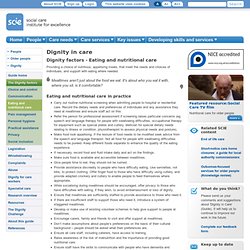
Despite this there are still serious concerns about nutrition in the health and social care sectors. The Department of Health is taking these issues very seriously; in October 2007 it published a joint action plan, ‘Improving nutritional care’, and set up a delivery board to ensure implementation. The Council of Europe’s 10 Key Characteristics of good nutritional care offers a concise summary of the meaning of good nutritional careSome of the guidance available gives conflicting advice and information, particularly with regard to specific nutritional matters. Good nutrition depends on the needs of the individual.
Www.rgpc.ca/best/CEEFE/Presentation - HydrationSeniorsMonthJune2.pdf. Promoting hydration in patients with dementia in healthcare settings : Nursing Standard: Vol. 20, No. 44 (RCNP) Www.patients-association.com/Portals/0/Public/Files/AdvicePublications/Malnutrition in the community and hosptial settting.pdf. Userimages/ContentEditor/1373368440289/Nutrition-and-older-people.pdf. Eating. Dementia can greatly affect a person's relationship to food and eating.
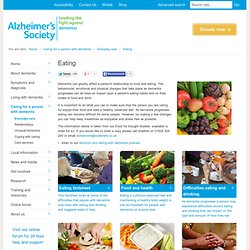
The behavioural, emotional and physical changes that take place as dementia progresses can all have an impact upon a person's eating habits and on their intake of food and drink. It is important to do what you can to make sure that the person you are caring for enjoys their food and eats a healthy, balanced diet. As dementia progresses eating can become difficult for some people. However, by making a few changes you can help keep mealtimes as enjoyable and stress free as possible. The information below is taken from our Food for thought booklet, available to order for £3. Www.northerntrust.hscni.net/pdf/Eating_well_with_dementia_leaflet.pdf.
Friedman School of Nutrition Science and Policy. Print Email To correspond with MyPlate, the federal government's new food group symbol, Tufts University researchers have replaced The Modified MyPyramid for Older Adults with MyPlate for Older Adults, which can be found here.
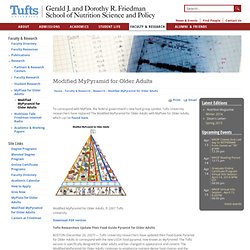
Tufts Researchers Update Their Food Guide Pyramid for Older Adults BOSTON (December 20, 2007) — Tufts University researchers have updated their Food Guide Pyramid for Older Adults to correspond with the new USDA food pyramid, now known as MyPyramid. The Tufts version is specifically designed for older adults and has changed in appearance and content. "Adults over the age of 70 have unique dietary needs," says first author Alice H. In 2005, the USDA debuted MyPyramid, an Internet-based program capable of dispensing individualized dietary guidance based on sex, age, height, weight, and exercise habits.
The Modified MyPyramid for Older Adults will be published in the January 2008 issue of the Journal of Nutrition. Nutrition for Older Adults. Ways to Boost Fiber Fiber is an essential nutrient.
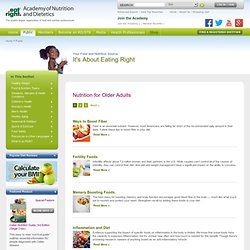
However, most Americans are falling far short of the recommended daily amount in their diets. Follow these tips to boost fiber in your diet. Read More » Older adults. Key points In the UK, life expectancy has doubled over the last 200 years and now around 16% of the population is aged over 65 years.
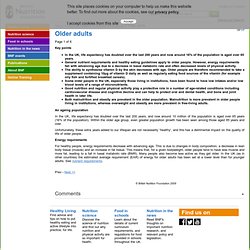
General nutrient requirements and healthy eating guidelines apply to older people. However, energy requirements fall with advancing age due to a decrease in basal metabolic rate and often decreased levels of physical activity.The ability to synthesise vitamin D by the skin decreases with age. An ageing population In the UK, life expectancy has doubled over the last 200 years, and now around 10 million of the population is aged over 65 years (16% of the population). Unfortunately, these extra years added to our lifespan are not necessarily ‘healthy’, and this has a detrimental impact on the quality of life of older people. Www.careinfo.org/wp-content/uploads/2013/02/Iddon-Mike.pdf. Www.alz.co.uk/sites/default/files/nutrition-and-dementia-introduction.pdf. Www.northerntrust.hscni.net/pdf/Eating_well_with_dementia_leaflet.pdf.
Importance of good nutrition and ensuring a person with dementia is well nourished. Discusses the importance of good nutrition, and provides some practical ways that families and carers can ensure that a person with dementia is well nourished.
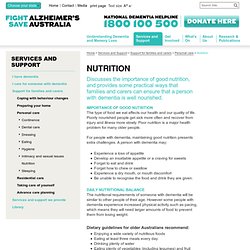
Importance of good nutrition The type of food we eat affects our health and our quality of life. Poorly nourished people get sick more often and recover from injury and illness more slowly. Poor nutrition is a major health problem for many older people. For people with dementia, maintaining good nutrition presents extra challenges. Experience a loss of appetite Develop an insatiable appetite or a craving for sweets Forget to eat and drink Forget how to chew or swallow Experience a dry mouth, or mouth discomfort Be unable to recognise the food and drink they are given. Daily nutritional balance The nutritional requirements of someone with dementia will be similar to other people of their age.
Dietary guidelines for older Australians recommend: Some common problems Some people with dementia may forget to eat. What to try Finger foods. Dementia and nutrition. Many people living with dementia may experience a change in their relationship with food, eating and drinking.
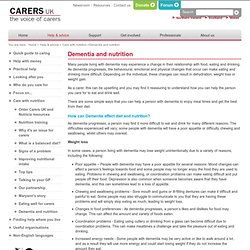
As dementia progresses, the behavioural, emotional and physical changes that occur can make eating and drinking more difficult. Depending on the individual, these changes can result in dehydration, weight loss or weight gain. As a carer, this can be upsetting and you may find it reassuring to understand how you can help the person you care for to eat and drink well. There are some simple ways that you can help a person with dementia to enjoy meal times and get the best from their diet.